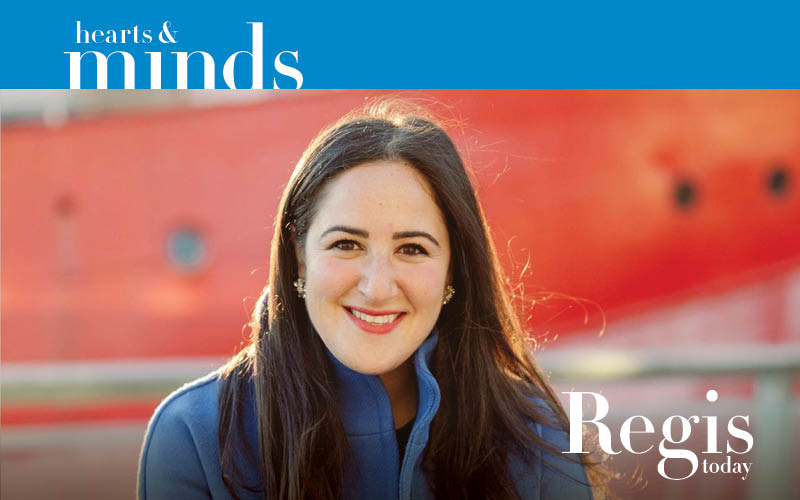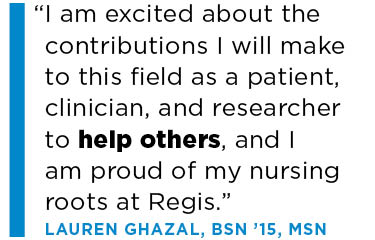
Story by Ashley Starr
Life is 'Brutiful'
Lauren Ghazal, BSN ’15, MSN ’16, PhD, FNP-BC, was pursuing her PhD at New York University and working as a family nurse practitioner when she began feeling tired and losing weight. “I had only been living in NYC a few months, and, at the time, just attributed it to a normal adjustment to the hustle of city life,” Ghazal recalls.
But when Ghazal identified a non-tender lymph node right above her collarbone, she went to her primary care physician and a series of specialists before receiving a diagnosis of stage 2 Hodgkin Lymphoma.
“I truly would not have found my cancer as early as I had if I was not a nurse practitioner,” Ghazal says. “Even my oncology team was super impressed with my clinical assessment skills.”
She is forever grateful for the many influential Regis professors and research opportunities that provided her with critical clinical experience that helped save her life. Ghazal went through six months of treatment, including fertility preservation and chemotherapy.
“Looking back, I put too much pressure on myself to be at the top of my game throughout treatment because of my health care background,” Ghazal says. “But now I understand, with cancer, there’s so much uncertainty and you can’t control most of your treatment or response to treatment.”
At the end of her treatment, Ghazal was elated to see the clear scan telling her she was in remission, but she still found herself asking, “What now?” She had finished treatment, but no one told her about the struggles she would face the first few years after active treatment.
“There was so much to process after everything I went through; it was a very stressful time, leaving me with a lot of anxiety,” Ghazal says. Thanks to a friend’s recommendation, she started seeing a therapist when she was first diagnosed and continues to this day. “Mental health was never discussed during my active treatment, but therapy is where my healing truly started.”
By sharing her story, Ghazal hopes to help eliminate the stigma around discussing mental health and give more people the courage to seek the resources and help they need. “A friend told me the reason she started seeing a therapist after having a baby was because I was so open about my experiences,” Ghazal says. “You have no idea what that means to me.”
Ghazal’s diagnosis completely shifted the trajectory of her career, which now focuses on cancer survivorship, specifically among adolescents and young adults (AYAs), an age group with unique challenges and needs.
“I came out of active treatment asking so many questions about how to support patients before, during, and after cancer and saw many gaps in the literature available,” she recalls. “AYAs are diagnosed at such a pivotal moment in their life when they are trying to figure out who they are and what they want to do with their lives, and also trying to become financially independent.”
Ghazal’s PhD dissertation focused on work-related challenges and financial toxicity in AYA cancer survivors, specifically looking at how cancer impacted their future careers and ultimately their quality of life. Now more than three years in remission, she is a postdoctoral fellow at the University of Michigan-Ann Arbor working on a research project funded by the National Cancer Institute on social genomic mechanisms of health disparities among AYA cancer survivors.
“I wear a bracelet with the phrase ‘brutiful’ as a daily reminder that life is both brutal and beautiful,” Ghazal says. “It’s hard to embrace the brutal moments, but I’ve learned there can also be beauty in them. I am excited about the contributions I will make to this field as a patient, clinician, and researcher to help others, and I am proud of my nursing roots at Regis.”
Read more articles
Read the entire magazine online